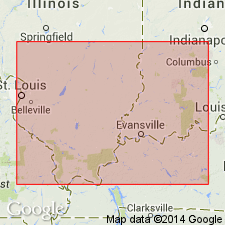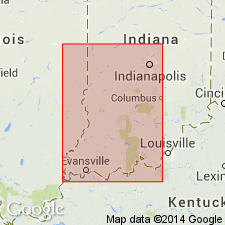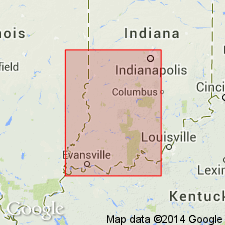
- Usage in publication:
-
- Joppa Member
- Modifications:
-
- Named
- Dominant lithology:
-
- Shale
- Sandstone
- Limestone
- AAPG geologic province:
-
- Illinois basin
Summary:
Joppa Member formally proposed in this report for shale, sandstone, and limestone of Genevievian age that lie upon limestone assigned to Karnak Member of Ste. Genevieve Limestone and beneath clastic rocks assigned to Rosiclare Member of Aux Vases Sandstone. Joppa is assigned to the Ste. Genevieve wherever presence of a prominent limestone bed at its top makes this practical, but to Aux Vases Sandstone wherever absence or thinness of the limestone bed makes separation of Joppa from Aux Vases impractical. In most of southeastern Illinois the Joppa has been called "Aux Vases lime" and is unit between "Indiana Ste. Genevieve top" and the "Illinois Ste. Genevieve top." It is in this region that the Joppa is most useful and is considered member of Ste. Genevieve. At type section is represented by 32 ft of shale, only partially exposed, containing thin sandy layers near base and beds of hematitic, oolitic limestone up to a foot or so thick in upper part. Type section lies upon that of Karnak Limestone Member and beneath 19 ft of poorly exposed sandstone and shale of Rosiclare Member of Aux Vases, which in turn is overlain by about 4 ft of Levias.
Source: GNU records (USGS DDS-6; Reston GNULEX).

- Usage in publication:
-
- Joppa Member
- Modifications:
-
- Areal extent
- Dominant lithology:
-
- Dolomite
- AAPG geologic province:
-
- Illinois basin
Summary:
Joppa Member of Ste. Genevieve Limestone extended into subsurface of IN. Characterized by abundant dolomite and dolomitic limestones interbedded with shales and sandstones. Sandstones are light colored, calcareous, very fine grained, and generally shaly; they may grade into very sandy to shaly carbonate rocks. Most shales are gray or green, some red or maroon, and are calcareous, silty to sandy, and fossiliferous. Joppa Member ranges from 15 to 35 ft in thickness. Replaced by equivalent beds of the Karnak Member in the outcrop belt and in the very shallow subsurface.
Source: GNU records (USGS DDS-6; Reston GNULEX).

- Usage in publication:
-
- Joppa Member*
- Modifications:
-
- Overview
- AAPG geologic province:
-
- Illinois basin
Summary:
Used as Mississippian (Valmeyeran) Joppa Member of Ste. Genevieve Limestone in IN. Authors follow usage of Droste and Carpenter (1990).
Source: GNU records (USGS DDS-6; Reston GNULEX).
For more information, please contact Nancy Stamm, Geologic Names Committee Secretary.
Asterisk (*) indicates published by U.S. Geological Survey authors.
"No current usage" (†) implies that a name has been abandoned or has fallen into disuse. Former usage and, if known, replacement name given in parentheses ( ).
Slash (/) indicates name conflicts with nomenclatural guidelines (CSN, 1933; ACSN, 1961, 1970; NACSN, 1983, 2005, 2021). May be explained within brackets ([ ]).

